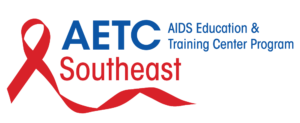Interprofessional Education (IPE)
Building the HIV Workforce
The Interprofessional Education (IPE) program educates health professionals and trainees to address the health care needs of people with HIV (PWH) through interprofessional education and collaborative practice. The goals of the Southeast AETC IPE Program are to:
- Cultivate respectful professionals,
- Prepare a collaborative practice–ready work force,
- Improve health care delivery and systems
- Create self-directed lifelong learners.
Interprofessional Education Collaborative Core Competencies
- Values and Ethics: Work with team members to maintain a climate of shared values, ethical conduct, and mutual respect.
- Roles and Responsibilities: Use the knowledge of one’s own role and team members’ expertise to address individual and population health outcomes.
- Communication: Communicate in a responsive, responsible, respectful, and compassionate manner with team members.
- Teams and Teamwork: Apply values and principles of the science of teamwork to adapt one’s own role in a variety of team settings.
Source: Interprofessional Education Collaborative
Student Testimonials
Medical Student
“100,000% IPE influenced me. I learned that I like managing complex patients, both medically and socially. Being at the VCCC has been so enjoyable and I am strongly considering ID as a specialty.”
Nursing Student
“Prior to starting IPE I did not have plans to work specifically with individuals living with HIV. IPE has opened my eyes to the opportunities available in working with this population and given me confidence in navigating the resources available to them. Now, I can see that working with this population encompasses all the demographics that I want to see in my future practice. Whenever I am asked, I tell people it would be an honor to continue working with this population.”
Pharmacy Student
“My baseline knowledge of HIV/AIDS was not much more than knowing what the acronyms stood for. After starting the program, I began to feel very attached to this patient population and was fascinated by not only HIV, but infectious diseases in general. It is such a unique population of people and it opened my eyes to caring for a person as a whole. There is so much misinformation and lack of knowledge/experience, even among educated professionals, that I definitely took ownership in being the person that others came to for questions or insight. I knew very early on that I wanted a career that somehow involved working with people living with HIV. Unfortunately, there are few career opportunities for pharmacists that are as niche as working with people living with HIV. However, after graduation I began working as a clinical staff pharmacist at the hospital in my hometown of Glasgow, KY where I became the unofficial “infectious disease pharmacist” (we are too small to really have specialties). I have been able to educate many of my colleagues about the nuances of this population and disease state. I think I will always feel a connection to this population of people.”
Social Work Student
“This was a wonderful experience. IPE helped me to gain insight into a population that I had never thought of working with. I had little to no knowledge of HIV/AIDs but love to learn. The staff at the SE AETC was a wealth of knowledge and were so patient to explain things in a way that did not overwhelm me. My favorite part of the experience was being able to shadow a client from the beginning of an appointment in the waiting room to check out. It was really amazing to see everything that client’s go through during one visit with their doctor from labs to case management. IPE gave me the confidence to apply to my now job at Careteam+ in Conway, SC as a medical case manager. Without that prior experience, I would not have considered myself qualified for the job. Flash forward and I now have 80 clients that are HIV positive that I have the privilege of working with as their case manager. I am beyond grateful for the IPE experience and the opportunities it has afforded me.”
